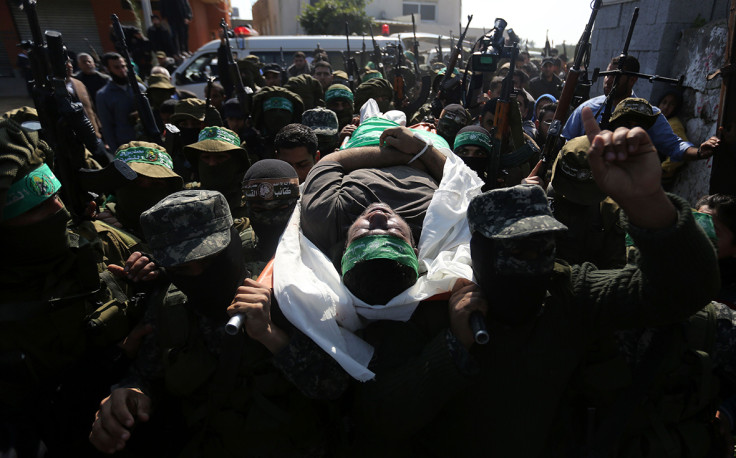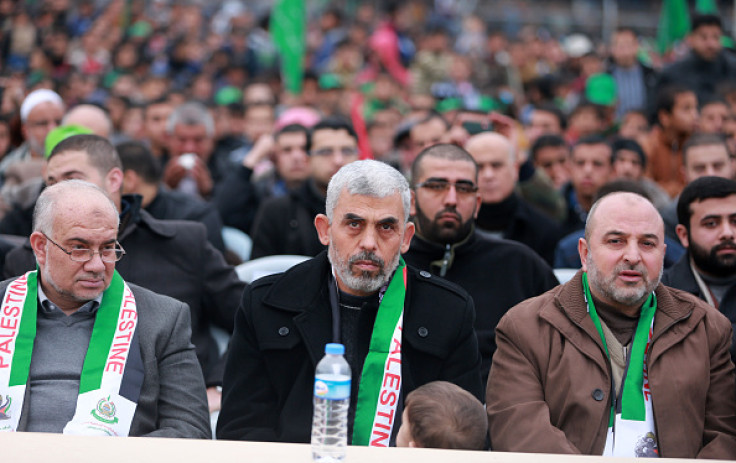Hamas: Militants and moderates collide over demand for Palestine 'from the river to the sea'
The debate over whether to re-write charter that calls for Israel's destruction is raging in Gaza.

Of all the players involved in the Middle East's most entrenched and bitter conflict, few would have seen Hamas as a champion of compromise. Ever since its creation in 1987, the Palestinian Islamist group has ruled out any negotiations with Israel and the establishment of a Palestinian state 'from the river to the sea'.
But Ashraf al-Ajami, a former minister for prisoners' affairs in the Palestinian Authority, suggested last week that Hamas may be about to re-write its 1988 founding charter and support a Palestinian state within the so-called 1967 borders, the demarcation between Israeli and Palestinian land that existed before the Six Day War.
It was after that conflict – when Egypt, Jordan and Syria invaded Israel – that the Israelis occupied east Jerusalem, the Gaza Strip and the entire West Bank, which they control to this day. The official position of the international community under the 'two-state solution' is that the pre-war borders will prevail in an eventual peace deal.
Fatah, the Palestinian faction led by Palestinian President Mahmoud Abbas, acknowledged the right of Israel to exist and renounced terrorism in the late 1980s, under Yasser Arafat. Hamas was founded in direct opposition to Arafat's compromise, and its charter explicitly states that no Palestinian land should ever be surrendered.
It reads: "The so-called peaceful situations are all contrary to the beliefs of the Islamic Resistance Movement. For renouncing any part of the Palestine means renouncing part of the religion [...]. There is no solution to the Palestinian problem except by jihad."
But ten years after Hamas took control of the Gaza Strip after winning elections and then fighting a brief but bitter war with its Fatah rivals, its commitment to armed resistance has cost Gaza dearly. After three bloody wars with Israel, it remains sealed off by the Israelis on three sides and a hostile Egypt on the other. Its infrastructure is still in ruins after the 2014 conflict, and an economic crisis has pushed the unemployment rate to over 40%.
It is now or never for Hamas.
Meanwhile, Hamas finds its own power threatened by more extreme Islamist movements in the strip, not least jihadi groups linked to Isis. Inside Gaza, radicals from within the Hamas movement and its armed wing, the Qassam Brigades, are jostling for position. Yehya al-Sinwar, a hard-line former Israeli prisoner, was recently appointed Hamas leader in Gaza, in a clear victory for the more radical elements in the movement.
This has all come at a time when Israel has been emboldened by US President Donald Trump, who has not only signified that the US may abandon its commitment to the two state solution but is seen as a key ally of right wing Israeli Prime Minister Benjamin Netanyahu. To Gaza's south, Egypt's leader General Abdel Fattah el-Sisi, is as hostile to Hamas as the Israelis. In 2017, Hamas finds itself with very few friends.
"Hamas is well aware of the regional issues and it is increasingly pressed because of the post-Arab Spring dynamics," said Hugh Lovatt, at the European Council on Foreign Relations. "It needs avenues to escape this or at least relieve pressure. One can see this as Hamas trying to get out of the corner in which it finds itself."
It is not the first time that the movement has intimated that it would be willing to accept 1967 borders. Over the past ten years various Hamas figures have suggested that the movement no longer believes – strategically, at least – in wiping Israel off the map. But with speculation that Hamas could re-write its charter as soon as early April 2017, this latest pledge suggests the group may be willing to put its money where its mouth is.
It has also been suggested that Hamas will remove the section of its charter relating to the Muslim Brotherhood, the global Islamist movement of which it has always been the Palestinian faction. Article two of the charter states that Hamas is "one of the wings of the Muslim Brothers in Palestine", but threats by Trump to blacklist the Brotherhood and Egypt's ongoing hostility to it has clearly got the Palestinian group spooked.
As always, there is also financial element. At present, funds given to the Palestinians by Europe and the US have had to go through the Fatah-dominated Palestinian Authority, with international donors unwilling to deal with a government that is classified as a terrorist organisation.

But recent years has seen a softening of this approach from the European Union. In 2007 after the split between Fatah and Hamas that followed the 2006 elections in the West Bank and Gaza, the EU stressed its support for Mahmoud Abbas and urged 'all Palestinian factions' to unite behind him.
In almost annual statements between 2009 and late-2014, the EU reiterated its support for both the Palestinian Authority and for Abbas, indicating that the two were inherently linked. But in July 2015 the EU only urged "all Palestinian factions to find common ground, based on non-violence," not mentioning Abbas.
Hamas are still avowedly pro terror.
This has been taken by some as an indication that the EU is willing to consider a PA that includes factions other than Abbas' Fatah movement, even possibly Hamas.
That said, a recognition of 1967 borders may not be enough for the EU, which requires the Palestinians to agree to the three conditions imposed by the Quartet on the Middle East (made up of the US, Europe, Russia and the UN): (a) the recognition of Israel, (b) abiding by existing agreements and (c) renouncing violence.
"Hamas are still avowedly pro terror: they are not renouncing terror the way that the PLO did in the past," said Grant Rumley, a research fellow at the Foundation for Defense of Democracies and co-author of The Last Palestinian: The Rise and Reign of Mahmoud Abbas. But he thinks going beyond the rhetoric and updating the charter would be unprecedented: "If they actually do amend [it], that would be a game changer," he said.
The re-writing of the charter – should it go ahead – represents a battle between moderates and hardliners within Hamas. With a hostile Egypt, a bullish Israel and Donald Trump in the White House, Hamas can either look to improve its relationship with outside allies, including the Palestinian Authority, the European Union and other Arab states by toning down its rhetoric, or it can throw in its lot with Iran and prepare for the next inevitable war.
But next time there will be no John Kerry or Barack Obama to temper the excesses of the Israelis – next time Hamas picks a fight with the Israelis, it will be on its own. For the West, this could also be an historic chance to bring into the fold a group that, despite their rhetoric, millions of Palestinians support.
"The avenue of trying to bring Hamas in from the cold is still there, but I am not persuaded it will be there forever," said Lovatt. "It is now or never."
© Copyright IBTimes 2024. All rights reserved.






